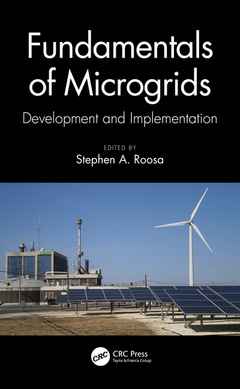Description
Fundamentals of Microgrids
Development and Implementation
Language: English
Subjects for Fundamentals of Microgrids:
Keywords
Energy Resources; DERs; smart microgrids; Energy Source; power management system; Solar PV; hybrid energy generation technologies; Electric Vehicles; energy blockchain; Energy Storage; electrical energy systems; Microgrid Projects; Smart Grid; Energy Storage System; Microgrid Applications; Hybrid Generation Systems; Energy Efficiency; HRES; Thermal Energy Storage; Electrical Generation Technologies; Diesel Fuel; Community Microgrids; Business Case; Island Microgrid; Ess; Wave Energy; Smart Contracts; Ami; Sustainable Buildings; Architecture; Microgrids; Regulation; Renewable energy; Smart technology
· 15.6x23.4 cm · Hardback
Description
/li>Contents
/li>Readership
/li>Biography
/li>
Microgrids provide opportunities to develop new electrical networks targeted for the needs of communities. The fourth industrial revolution is associated with the global trend toward decentralizing energy grids. Within this context, microgrids are seen as a solution to how renewable electricity can be supplied to local areas. The Fundamentals of Microgrids: Development and Implementation provides an in-depth examination of microgrid energy sources, applications, technologies, and policies. This book considers the fundamental configurations and applications for microgrids and examines their use as a means of meeting international sustainability goals.
It focuses on questions and issues associated with microgrid topologies, development, implementation and regulatory issues. Distributed energy resources are defined, stand-a-lone generation systems are described and examples of typical microgrid configurations are provided. The key components of developing a business model for microgrid development are also considered.
Features:
- Describes what microgrids are and details the basics of how they work while considering benefits of microgrids and their disadvantages.
- Provides answers to the fundamental questions energy managers and other professionals want to know about the basics of microgrids.
- Details the applications for microgrids and demystifies the types of microgrid architectures that are successful.
- Includes real-world examples of functioning microgrids which provide models for the development of microgrids in the future.
- Discusses the key considerations that must be addressed to develop a business case for microgrid development.
Chapter 1 Introduction to Microgrids Chapter 2 Environmental Drivers for Microgrid Development Chapter 3 The Roots of Microgrids Chapter 4 Traditional Electrical Supply Systems Chapter 5 Microgrid Architecture and Regulation Chapter 6 Linking Microgrids with Renewable Generation Chapter 7 Energy Storage Technologies for Microgrids Chapter 8 Hybrid Generation Systems for Microgrids Chapter 9 Community and Local MicrogridsChapter 10 Ghana’s Transition to Renewable Energy Microgrids Chapter 11 Local Energy Supply Possibilities—Islanding Microgrid Case StudyChapter 12 Energy Blockchain—Advancing DERs in Developing Countries Chapter 13 Smart Microgrids Chapter 14 Scoping the Business Case for Microgrids Chapter 15 It’s Back to the Future with Microgrids
Dr. Stephen A. Roosa has over 35 years of experience in commercial energy management, energy engineering and performance contracting. During his career he has been the corporate energy manager for a Fortune 100 company and worked in various capacities with a number of energy services companies. His past experience includes thousands of energy studies and over $250 million in energy conservation, energy management and performance contract projects that were developed for his customers.
Stephen is a past President of the Association of Energy Engineers (AEE). He currently serves as its Director of Sustainable State and Local Programs, as its Chairman of both the AEE’s Certified Sustainable Development Professional Board and Renewable Energy Professional Certification Board.
Stephen holds a Ph.D. from the University of Louisville, a Master of Business Administration from Webster University and a Bachelor of Architecture degree from University of Kentucky. He co-instructed his first graduate-level course at the University of Kentucky at the age of 19, implementing its first course in the use of the built environment as an educational medium. He has since taught graduate and undergraduate courses and professional certification courses and workshops throughout the U.S and in India, Saudi Arabia, Jordon, Kuwait, South Africa and the Dominican Republic. Stephen is a Certified Energy Manager, Certified Sustainable Development Professional, Certified Building Commissioning Professional, Certified Measurement and Verification Professional, Certified Energy Monitoring and Control System Designer, Certified Demand Side Management Specialist, Certified Building Energy Management Professional, Certified Renewable Energy Professional, and a LEED Accredited Professional.
Stephen is the Editor-in-Chief of the International Journal of Strategic Energy and Environmental Planning, a bi-monthly academic and professional journal. He is also on the Editorial Board
These books may interest you

Microgrids 103.03 €



